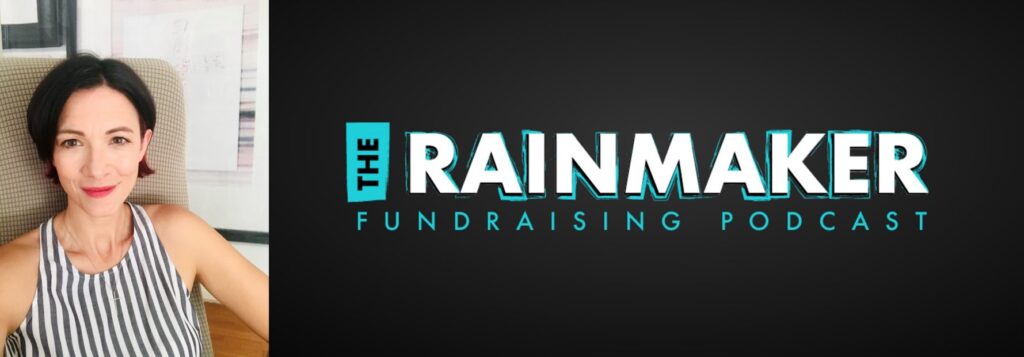
Everyone pretty much everywhere is talking about change right now. Coming out of the COVID-19 pandemic, change seems to be the word of the day. And if you’re not talking about change, you might be talking about transformation. That’s just bigger change, right?
What so many of us get wrong about change and transformation efforts is that we think it’s mechanical. It’s about changing the organization. The business. Processes. Systems.
But change and transformation work are never about the organization, your systems, or processes. They are 100% about your PEOPLE.
If you don’t have the right people, equipped, trained, coached, and mentored for success, any change or transformation efforts you undertake will likely fail.
That’s the conversation I got to have recently with Kat Landa, CFRE. Kat is Senior Vice President at ViewSpark, where she helps nonprofits unlock generosity through the use of video storytelling.
Kat is also an inspiring change leader on a personal mission to guide and nurture people to feel valued, have hope, find peace, and be life-giving to others.
In 2015, Kat and I were colleagues and were assigned to lead a major change effort. In this podcast conversation, you’ll hear Kat and I share an insider’s view of that effort. We talk about the complexities of leading change, what we did well, what we did poorly, and what all of us can learn from our mistakes and missteps.
Here are some of the key takeaways you’ll hear us discuss:
- If you don’t focus primarily on your people in any change initiative, you’re destined to fail.
- Gone are the days of a “change initiative” or “change effort”. We are now living in a time of rapid and constant change. This context should be central to your thinking as you communicate your change plans to your team. Don’t talk in starts and ends to change, but in evolutions and iterations instead.
- Because change is constant and long-term, you need to ensure that you as a leader are building person grit and resilience to sustain you over time. You also need to help your team build those same capacities so they don’t burn out early in your change efforts.
- Successfully leading change requires that we move beyond transactional thinking toward transformational, relationship-based thinking.
- The best change leaders are focused on caring for others, on prioritizing the emotional safety of their teams, and on ensuring that everyone involved in a change effort has clarity about their individual and collective future.
- During major change efforts, keep an eye out for people who caution you that you’re not seeing the landscape accurately. Those people are rare, and their willingness to boldly call out what you’re missing is pure gold. Celebrate their boldness and willingness to stand up and speak truth in the midst of challenge.
- Create ongoing reality checks into your change efforts. These are essentially “time outs” that you take with trusted advisors who can tell you whether you’re on track or need to adjust. Listen to them, and adjust your plans based on new information.
- Success as a change leader doesn’t mean you don’t make mistakes. In fact, you will make mistakes. They’re unavoidable. It does mean, however, that you’re willing to step back, learn from your mistakes, and adjust course to care for your people.
- Embrace progressive disclosure. In any major change effort, there will be sensitive information that needs to be shared. But sharing everything at once might be damaging to your people and your end goal. Share as much as you can, as widely as you can. But be prepared to continue dripping out information on a regular basis to make sure people know what they need to in order to feel informed about the change, and secure in your leadership.
- Often when leading change, we talk about the global impact of that change. We discuss the organization’s new course, how this changes the landscape in our sector, etc. But what your people really want to hear is how this change impacts them individually. It’s important to share the global aspects. But it’s critical that you paint a picture for every member of your team about how any change will impact them personally.
- One of the big misses change leaders make is not creating space for people to mourn during a change effort. During any change effort, people will be resistant to giving up what they are comfortable with. Your job might be to push them out of that comfort zone. And that’s a good thing. But you can’t neglect the fact that in change, some people will experience loss, and will want and need to mourn those losses before moving forward. Be intentional about creating that space for them.
- All the encouragement, inspiration, and free snacks in the breakroom won’t overcome the fact that you haven’t addressed the actual pain points in your organization. Encouragement and snacks are good — but people want you to help solve what’s keeping them from being successful.
- Burnout is happening faster than ever before. Beware of the stresses of change that are compounded by the general increased stresses we’re all experiencing these days.
- As a leader, you have your “regular” work, then major initiatives like leading big change. Then you have family obligations, etc. Please take time to regularly reflect and catch your breath. You’re no good to anyone if you are so stressed and burnt out that you can’t function.
- It’s ok to make mistakes. It’s ok to not be ok, and to admit that. It’s also ok to acknowledge that while major change may eventually be positive, can really stink in the moment.
Kat’s words of advice for leaders:
a. You’re not alone. Surround yourself with others who are on a similar path so you can support one another.
b. We are designed to learn and thrive in community. Don’t neglect investing in community when you’re going through challenging times.
c. Ask for help.
d. Shift your mindset. Don’t focus on your 3-year effort. Focus on what you can accomplish in the next 10 days. Or even the next 24 hours.
e. Celebrate EVERY win. You’ll appreciate the momentum it creates.
